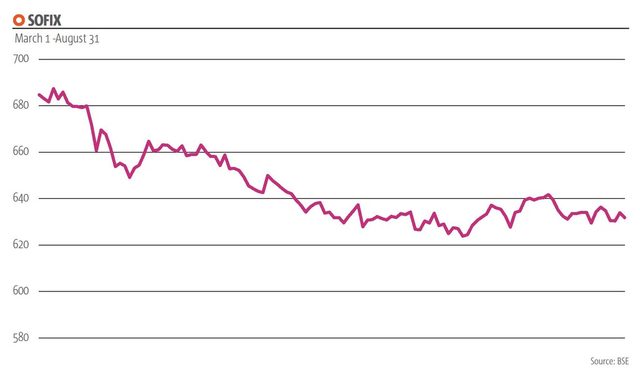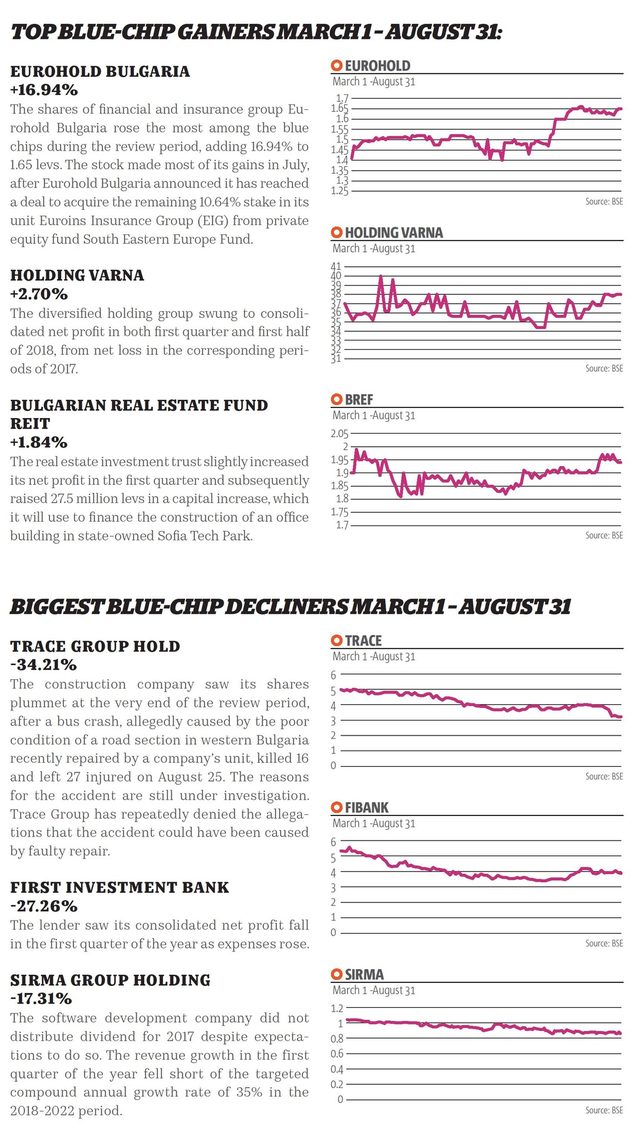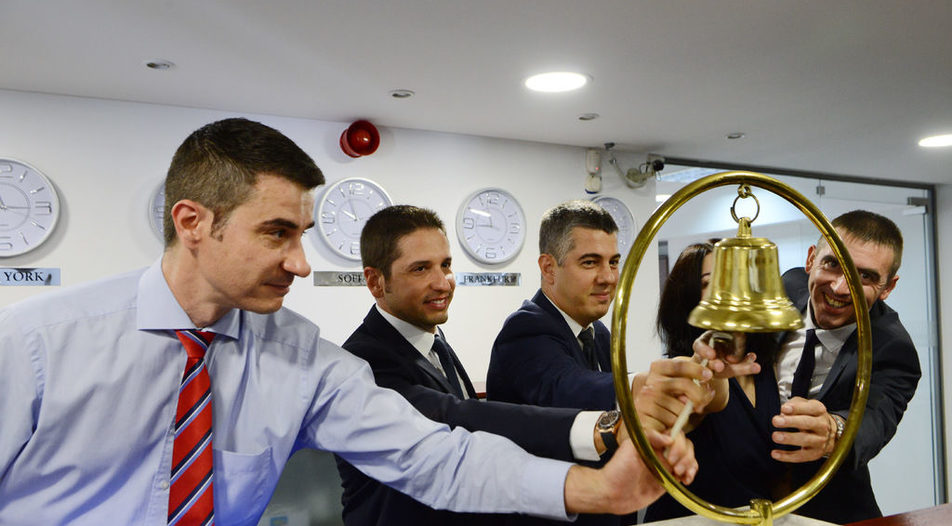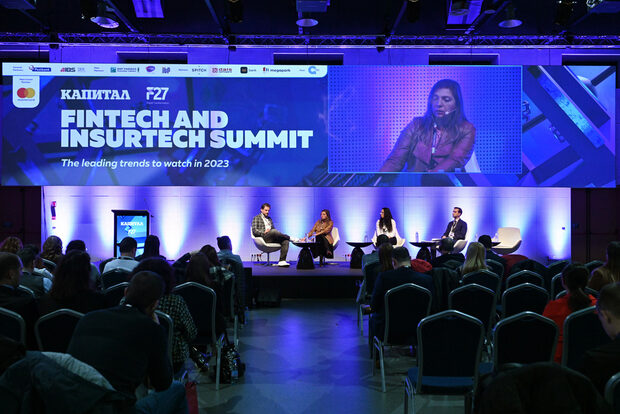Total trading turnover on the regulated market of the Bulgarian Stock Exchange (BSE) fell by an annual 21% in the six-month period ended August 31, despite poultry producer Gradus' IPO - the biggest on the bourse since 2007 and the second-largest all-time.
Turnover totaled 132.6 million euro in the review period, down from 167.9 million euro a year earlier.
However, it must be noted that around half of the turnover in the prior-year period was formed in August alone, which, according to analyst opinions at the time, was caused by portfolio restructuring of institutional investors.
Major Developments
Gradus IPO. In June, Gradus raised 81.4 million levs through an IPO on the Sofia bourse, which valued the company at some 438.5 million levs. Investors subscribed for 45.2 million Gradus shares, 81% of the total offer, at a price of 1.8 levs apiece.
In the one month since being admitted to trade on the BSE in early August, over 500,000 shares in the company changed hands for some 1 million levs.
"The listing of Gradus is a positive signal to all other companies that the capital market can be a real alternative for financing of private businesses. The company has shown that a well-planned and precisely executed IPO can be a great success even in conditions of low investment activity," Ivan Takev, CEO of the Bulgarian Stock Exchange, commented following the IPO.
The IPO attracted a mix of institutional and retail investors, as pension funds snapped up around three-quarters of all subscribed shares.
Pension funds managed by Bulgaria's Pension Assurance Company Doverie, part of the Vienna Insurance Group, subscribed for some 27% of the total.
Trade in government securities. At the end of last year, 20 issues of government securities were listed for trade on the Bulgarian Stock Exchange - a move envisaged in the long-term development strategy of the bourse drafted in 2016 in collaboration with regulators and investors. The securities have a total face value of 5.5 billion levs.
Secondary trade in government bonds was expected to have a significant impact on the turnover on the BSE's regulated market, however, the securities attracted limited interest in the first half of 2018.
In June, trade in government securities started to slightly pick up, with deals in them generating a turnover of over 500,000 levs. In July, government securities worth a total of 6 million levs changed hands, followed by deals for a further 11.9 million levs in August.
In total, trade in government bonds generated a turnover of 18.9 million levs in the March-August period, equal to over 14% of the regulated market turnover during that time.
Listing of ETFs. During the review period, 10 exchange-traded funds (ETFs) run by Sofia-based Expat Asset Management were admitted to trading on the BSE regulated market. ETFs allow local investors to access foreign stock markets via a Bulgarian intermediary.
Each of the funds tracks the performance of a blue-chip index on the bourse of one of the following countries: Croatia, the Czech Republic, Greece, Hungary, Macedonia, Poland, Romania, Serbia, Slovakia and Slovenia.
What's to come
SME Segment. As part of the 2016 strategy for developing of the local capital market, the Sofia bourse has been actively pursuing the establishment of a segment for listing small and medium-sized enterprises (SMEs) but still has some way to go before accomplishing its ambitions.
At the end of last year, Bulgaria's Parliament adopted legislation paving the way for the establishment of a Multilateral Trading Facility (MTF) for SMEs. MTFs are self-regulated financial trading venues which serve as an alternative to traditional regulated markets on stock exchanges.
However, the Sofia bourse operator has been struggling to obtain regulatory approval for setting up the segment, as the Financial Supervision Commission has repeatedly asked the BSE to further elaborate on its plans - once in July and once in August.
Despite the regulatory hurdles, in July the bourse and the Ministry of Economy launched a 2.0 million euro voucher scheme to support small and medium-sized enterprises to list on the regulated market. The scheme envisages providing vouchers of 50,000 levs to cover the costs of SMEs related to the listing.
International Segment. The BSE is continuing to actively pursue the introduction of an international segment, where stocks from Western European and other major markets will be traded.
The segment could be introduced by the end of the year, the CEO of the BSE, Ivan Takev, announced in May.
The BSE obtained the right to operate the MTF needed for the launch of trading in stocks from foreign markets in January. However, the project was suspended twice for a total period of six months at the request of the market-maker which is taking part in the process, Takev said.

SOFIX nearing end of correction phase. The blue-chip SOFIX index of the BSE lost 7.73% between March and August, ending the period at 631.83 points. However, the index has been showing signs of recovery, gaining 0.80% since the start of the third quarter of the year.
Prices of Bulgarian stocks have stabilized during the third quarter and there are signs that the correction is over, according to Tsvetoslav Tsachev, chief investment consultant at local brokerage Elana Trading. However, most of the big companies did not show significant improvement of their first-half financial results so investors will wait for the third-quarter reports in order to determine which companies were affected by the financial turmoil in neighboring Turkey and which will manage to show larger profits, Tsachev said.
Tsachev's opinion regarding price stabilization is shared by local brokerage Karoll Capital Management, according to which the SOFIX components are currently trading at levels comparable with the average in the past two years. Their current price/earnings ratio stands at 12.5x, while the average value stands at 12.7x in the past two years, Karoll experts explain.

DIALOGUE HAС LED TO A MORE BALANCED TAX APPROACH TO TOBACCO PRODUCTS
What was the major event in your business sector in Bulgaria in the past quarter and why?Undoubtedly, the major event in the third quarter of 2018 was the regulatory debate around the legislative proposition for equalization of the tax on heated tobacco products to that on conventional cigarettes. We are glad that the public debate and the dialogue with legislators have led to a more balanced outcome to maintain the differentiated tax approach to the new product category that supports science, investments and innovation in the industry towards a potential reduction of harm from smoking.
What do you expect to be the next major development in your company's business in Bulgaria in the forthcoming quarter or further and why?
Bulgaria was the 32nd country in the world which became part of the major global transformation towards a smoke-free future. PMI continues to conduct extensive scientific studies to demonstrate that using our smoke-free products significantly reduces the harmful and potentially harmful chemicals compared to smoking cigarettes and we are glad that many independent regulatory and scientific bodies around the world already confirm our data. It is important to say that using smoke-free products is not risk-free. At the same time, we believe that our innovative technologies are likely to reduce risk vs. continued smoking in the long run.
George Margonis has been general manager of Philip Morris Bulgaria since the end of 2016. He has almost 17 years of experience in Philip Morris International, starting his career in the company at the Sales Department of Papastratos - the Greek affiliate of PMI. Mr. Margonis studied marketing & management and has also a master's degree in business administration from Kingston University in the UK.
Total trading turnover on the regulated market of the Bulgarian Stock Exchange (BSE) fell by an annual 21% in the six-month period ended August 31, despite poultry producer Gradus' IPO - the biggest on the bourse since 2007 and the second-largest all-time.
Turnover totaled 132.6 million euro in the review period, down from 167.9 million euro a year earlier.











